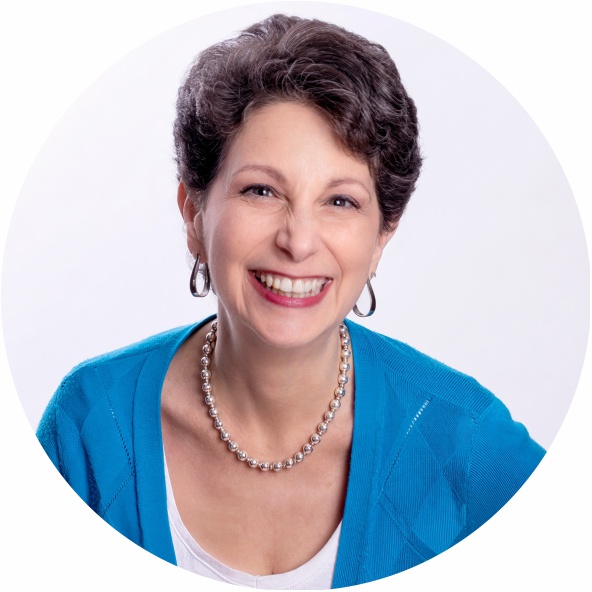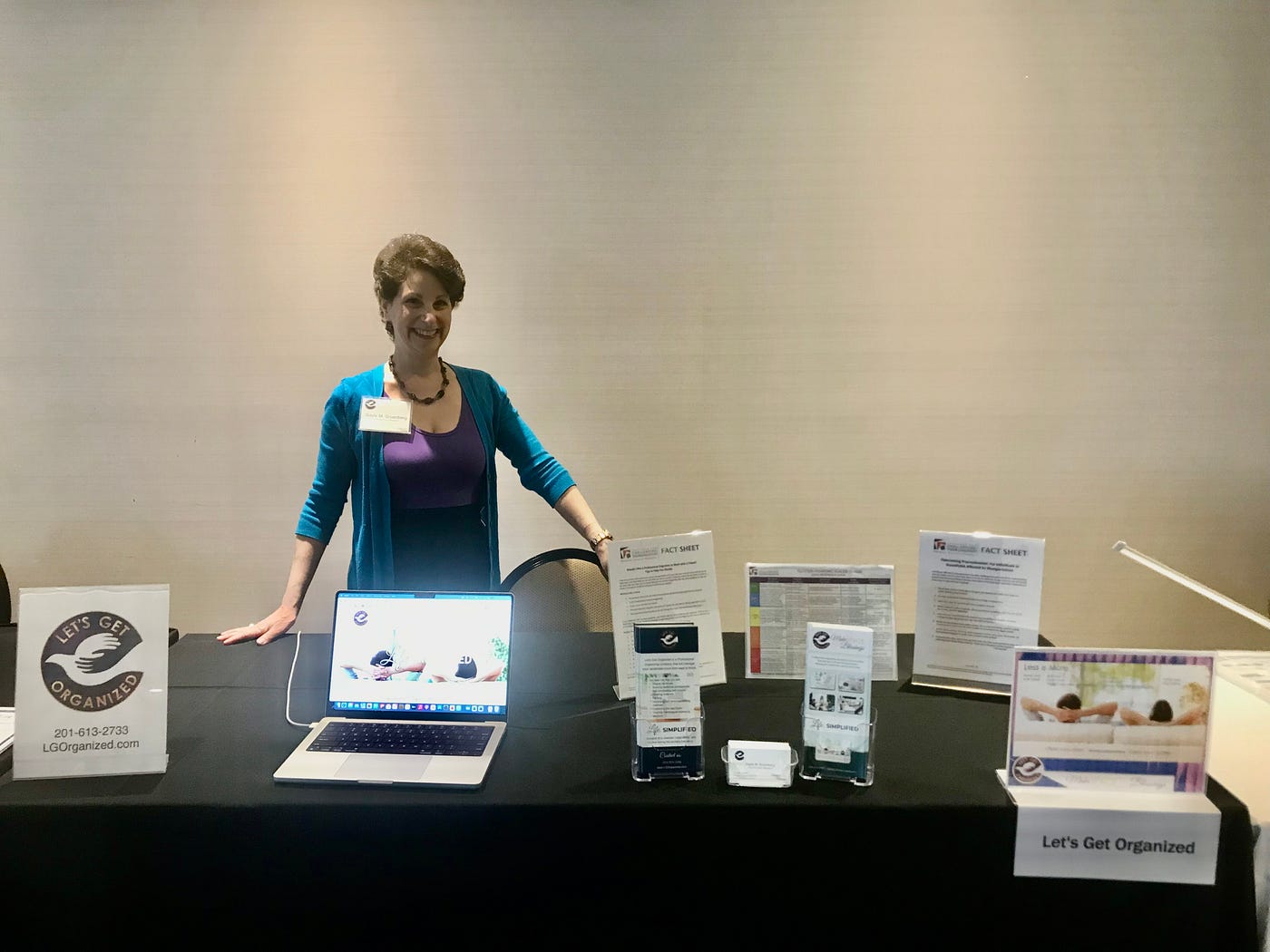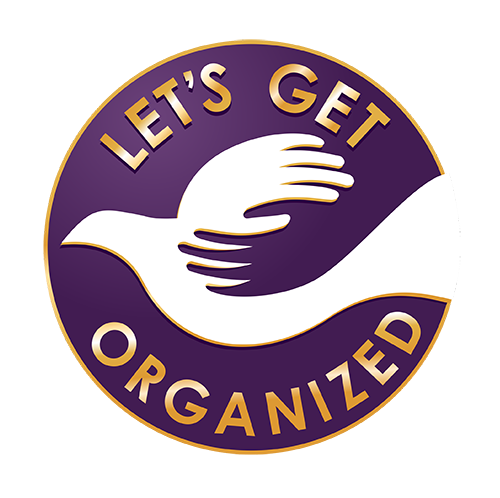Gayle Gruenberg interviewed by Authority Magazine!

“We live in a time of great excess. We have access to fast fashion, fast food, and fast everything. But studies show that all of our “stuff” is not making us any happier. How can we simplify and focus on what’s important? How can we let go of all the clutter and excess and find true happiness? In this interview series, we are talking to coaches, mental health experts, and authors who share insights, stories, and personal anecdotes about “How Simplifying and Decluttering Your Life Can Make Us Happier.” As a part of this series, I had the distinct pleasure of interviewing Gayle Gruenberg.” – Drew Gerber
Gayle is the Chief Executive Organizer of Let’s Get Organized, LLC, based in northern New Jersey, USA.
She is a Certified Professional Organizer in Chronic Disorganization, Certified Virtual Professional Organizer, and an Organizer Coach, as well as the organizing Life Strategist with the lifestyle brand Change Your Attitude, Change Your Life on New York’s AM 970 and iHeart Radio.
Gayle speaks and writes about Chronic Disorganization, is frequently featured in international publications and online media, and is the author of two min-ebooks on organizing, available on Amazon, as well as the upcoming Get the Big O (Organized, of course)! 7 Steps to Your MOST Satisfying Life.
Thank you so much for doing this with us! Before we dive in, our readers would love to “get to know you” a bit better. Can you share your “backstory” with us? What was it that led you to your eventual career choice?
Thank you for having me! I used to be a CPA (Certified Public Accountant), and I was miserable. (I’m fully recovered now, thankfully.)
My children were small at the time, I was surrounded by the three walls of a cube, had no idea what season it was, and felt I was meant to have a bigger impact on the world. I took off the month of November, which is slow for accountants, to think about my options. I reached out to a former colleague who had left the firm where I was working and explained my situation. She told me about a professional organizer she knew through networking and said, “Gayle, you’d be perfect for that.” Lightning strike! Of course! Eleven years earlier, in 1992, when I had been at an earlier career crossroads, I had registered the company name Let’s Get Organized. I resurrected the name, formed a legal entity, reached out to my immediate world to let everyone know what I was doing, and within twelve hours I had my first (albeit pro bono) client. The rest is history.
Can you share the most interesting story that happened to you since you started your career?
Wow, the most interesting…. Good question. It’s been nearly two decades, so to pick just one is a challenge. I’d have to say the best story is the personal and professional journey of growth I’ve been able to enjoy. I started the business when I was 36 and married with two small children. I’m now 55, am divorced, and my kids are in their 20s. My business went from just me, scrambling to find clients and break five figures, to a team of other organizers and support professionals now striving to break seven figures. I’ve held leadership positions in my professional associations, traveled around the country, spoken internationally, and written books. I still feel like I’m just getting started!
Are you working on any exciting new projects now? How do you think that will help people?
I’m excited to get my first full book published. It’s been quite a while in the making and has gone through several iterations. It’s called Get the Big O (Organized, of course)! 7 Steps to Your MOST Satisfying Life. The book is intended to reach people who are living with Chronic Disorganization (CD) and need help getting organized so they can live what they call a “normal” life. I’ve dedicated it to all of the prospective clients who wanted to work with me but couldn’t — because they couldn’t afford to, they had too much shame to let someone in, or they just weren’t ready for change. I want people living with CD and brain-based challenges related to Executive Function to know there are resources available to them and professionals who can help.
Can you share with our readers a bit about why you are an authority on the topic of “How Simplifying and Decluttering Your Life Can Make You Happier”?
I’ve invested a great deal of time, money, and energy learning not just about organizing but about how the brain functions. I’ve worked with hundreds of clients living with Chronic Disorganization and Executive Function challenges who have taught me just as much as I’ve taught them. People call us in tears of frustration and overwhelm, feeling like a failure and having no idea where to turn. After working with us, they are in tears of joy and disbelief, saying, “I could never have done this without you.”
Ok, thank you for that. Let’s now jump to the main focus of our interview. We live in a time of excess. We have access to so much. But studies show that all of our “stuff” is not making us any happier. Can you articulate for our readers a few reasons why all of our possessions are not giving us happiness?
I’m on a long-term path of spiritual growth, both personally and professionally. In my learning and experience, I’ve come to the conclusion that happiness comes from within. We can’t rely on anything external to make us happy — not other people, places, or things. Not food, not possessions, not numbing substances. I think that we need to realize that happiness is a choice. We can choose to be happy with what we have and feel an attitude of gratitude; things could always be worse. Chasing after the next big thing is not going to fulfill us; we’ll only want for the next bigger thing. When we have a deeper connection to who we are and whatever higher being or force we choose to embrace, we feel grounded, calm, content, and full. Then we don’t need to go out pursuing “stuff” that will ultimately wind up in a landfill.
On a broader societal level, how do you think this excessiveness may be harming our communities and society?
Oh boy. Let’s start with competitiveness, greed, jealousy, resentment, a sense of entitlement, selfishness, “comparisonitis,” narcissism, a zero sum game, a lack of personal responsibility, a loss of personal interaction and communication, the whole Pandora’s box of negative emotions. We see that someone has something we don’t, which engenders feelings of emptiness and “less-than.” We go out and acquire “stuff” in the hope that we’ll feel better about ourselves and “filled up.” It doesn’t work. The momentary feeling of contentment wears off, the cycle repeats itself, and then we’re stuck with a life full of “things” that cost money to store and energy to care for. The constant production and acquisition of “things” is raping the planet of its resources, and we’re polluting the universe with garbage. The statistics about textiles alone are staggering. According to CALPIRG, an average American throws away roughly 81 pounds of clothes every year, approximately 85% of our clothes end up in landfills or burned (yes, I looked it up), and about 60% of our clothes are not recyclable, as they’re made of synthetic (plastic) fibers. The implications about the impact on our air, water, and earth are extremely concerning, as the future health of plants, animals, and people are greatly threatened. This question can really get me on my soap box!
The irony of struggling with happiness in modern times is glaring. In many places in the world today, we have more than ever before in history. Yet despite this, so many people are unhappy. Why is simplifying a solution? How would simplifying help people to access happiness?
I coined the phrase Make Space for Blessings, my company’s tag line, as a result of my personal spiritual journey, and I found this really resonates with clients. It’s a mindset of identifying our core values, consciously deciding what is most important to us, and allowing into our lives only that which supports those core values. It’s living mindfully. Simplifying our lives frees us up to devote our resources — time, money, attention, space, emotions — to what we love most and what gives us the most joy (note: professional organizers have been saying this long before Marie Kondo came on the scene). I have to reiterate that we first need to identify what that is and make a conscious decision to live this way. Most people’s lives are like a freight train — speeding ahead at hundreds of miles an hour. Stopping the train, taking the introspective time needed to make these changes, is very difficult.
Can you share some insights from your own experience? Where in your life have you transformed yourself from not having enough to finally experiencing enough? For example, many people feel they don’t have enough money. Yet, people define abundance differently, and often, those with the least money can feel the most abundant. Where in your health, wealth, or relationships have you transformed your life?
Thank you for asking this question. I have personally done a ton of internal work to combat my own demons around the concept of feeling abundant. The short answer dovetails on the previous question. The first step is to stop, look around, take stock of our lives, and consciously recognize all that we DO have. It’s a mindset shift from seeing what isn’t there to seeing what is. It’s being thankful and grateful for everything on a daily basis, even if life seems bleak. My spiritual journey comes into direct play here. About 15 years ago I switched communities. I had attended a Conservative Jewish congregation for the first 40 years of my life, and then I started going to Chabad, an Orthodox Jewish community, which follows the teachings of the Lubavitcher rebbes. I’ve learned so much in these last 15 years! One small thing I’ve learned is that there is a prayer we say upon opening our eyes in the morning: “I offer thanks to You, living and eternal King, for You have mercifully restored my soul within me; Your faithfulness is great.” These are the first words we utter every morning — while still lying in bed. Our first conscious moments are spent thanking G-d for the gift of life. Overall, I try to go through life with an attitude of gratitude. I frequently say, “I’m vertical. The rest is gravy.”
People, places, and things shape our lives. For example, your friends generate conversations that influence you. Where you live impacts what you eat and how you spend your time. The “things” in your life, like phones, technology, or books impact your recreation. Can you tell us a little about how people, places, and things in your own life impact your experience of “experiencing enough?”
Great question! I would have to reiterate the need to be mindful and how I personally create filters around what I let in to my life. I consciously choose who I associate with. There is the saying that “birds of a feather flock together,” so I feel I naturally tend toward people who share my way of thinking — the attitude of gratitude, spirituality, love, giving, charity, whatever values I hold dear. The same conscious choices hold true for other things in my life — what I read, what I watch, how I spend my time, what I eat, the clients I serve. Almost everything I do is a conscious decision. That’s another thing I’ve learned from Chabad — the idea to stop and say a blessing before eating something is very powerful. The “stop” itself is huge! I pause, choose the right blessing based on what I’m eating, say the blessing to thank G-d for providing me with sustenance (that everything is a gift and I’m grateful for what I have), elevate the item so that my body can do mitzvot (commandments, good deeds), and then ingest the item. It’s a beautiful way to remember the source of what I have. I do try to bring this to my client engagements as well (thus Make Space for Blessings came about), if they are receptive to the idea. If not, I let it go. When I work with someone who has an overwhelming amount of “stuff,” and the session has been less than successful in not just purging unneeded items but in the personal interaction with the client, I come home and start to purge my own things. The urge (need) to purge is very strong. Professional organizing is a constant realization of just how little we really need to live a fulfilling life.
What advice would you give to younger people about “experiencing enough?”
My short answers would be, ”Decide to decide” and “Everything in balance.” This generation of young people grew up as digital natives. They don’t want the stuff from prior generations. They also have grown up in an affluent, accessible, disposable society, so there is the tendency to not value what they have quite as much as their ancestors did/had to. Overall, I would say, “Be mindful of how much time you spend on your phone/computer/technology. Remember to talk to people. Stay connected to others. Value what you have. Use things up before you purchase more. How much do you really need? Be grateful. Think of others. Share. Know your place in the world; we don’t exist in a vacuum.”

This is the main question of our interview. Based on your experience and research, can you share your “five ways we can simplify and declutter our lives to make us happier?”
1. Organize to your core values — let into your life only what makes you truly happy and let go of the rest.
2. Decide to decide — make deliberate choices.
3. Stay mindful and in the present — be cognizant of negative or anxiety-provoking thoughts and consciously turn them around.
4. Be grateful — everything is a gift.
5. Stay connected to others — I love the quote from Gandhi, “The best way to find yourself is to lose yourself in the service of others.”
You are a person of great influence. If you could inspire a movement that would bring the most amount of good to the most amount of people, what would that be? You never know what your idea can trigger. 🙂
I would love to create a movement of people just being kind to one another, having consideration for other living beings. You never know what’s going on behind someone’s eyes, and their behavior may reflect that. Just be nice. Maybe it’s Pollyanna, but I don’t care.
How can our readers further follow your work online?
Thanks for asking! My website and blog: https://lgorganized.com/blog/. Instagram: https://www.instagram.com/letsgetorganizedllc/ Radio appearance tips: https://www.cyacyl.com/gaylegruenberg
Thank you so much for these insights. This was so inspiring, and so important!
See the interview here!
